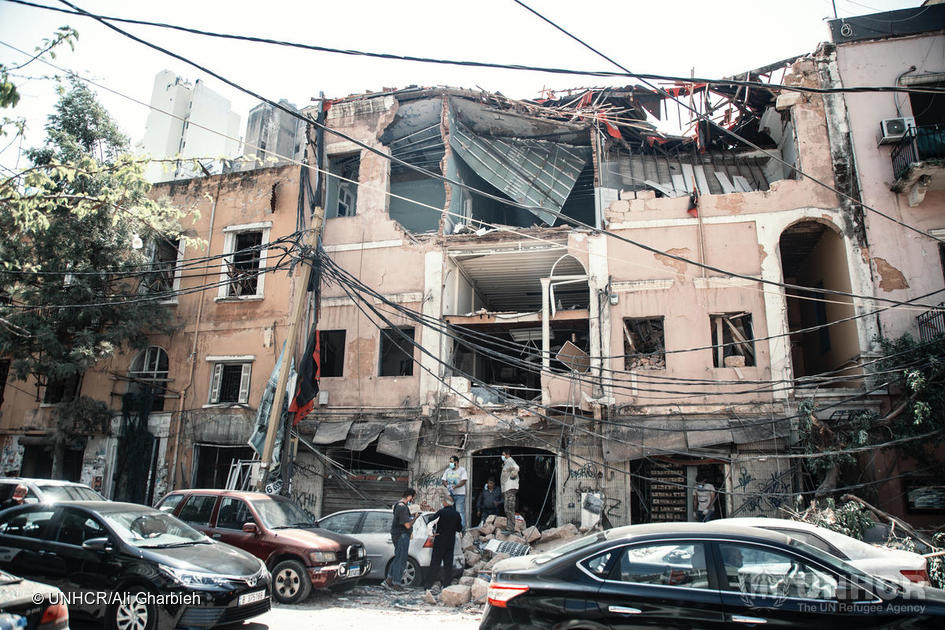Stand with Lebanon

Stand with Lebanon
On 4 August, the city of Beirut, Lebanon was hit by a devastating explosion which flattened most of the city’s port, damaging neighbourhoods and buildings across the capital. It left more than 220 people dead, 5,000 people injured, and a reported 300,000 people displaced.
The explosion adds to the already severe economic crisis that had pushed many Lebanese and refugees there deeper into poverty, further aggravated by the COVID-19 pandemic. UNHCR’s immediate humanitarian response covers the entire community – including Lebanese, refugees and migrant workers. It focuses on the most vulnerable in the community and on two key areas – shelter and protection.
Refugees Respond to the Emergency
Lebanon is host to hundreds of thousands of refugees, and among the 200 fatalities of the deadly explosions are at least 34 reported refugee victims so far. Another 124 refugees have been hurt in the blast, and 7 are still missing.
When the explosions in Beirut devastated the city he has called home for the past 7 years, Syrian refugee Mohamed Haj Khamees knew there was only one thing to do: pick up a broom and head out to help those whose houses have been impacted. Hundreds of thousands of people had their homes fully or partially destroyed, and refugees are keen to give back to the city and people that sheltered them.
Syrians, Lebanese, Palestinians – the entire community worked together to remove debris from the streets, distribute food and water to those who need it, and tend to those affected.
"We are working as one to help wounded Beirut. We are standing together hand in hand to help everyone to lift the dust cloud over our beloved Beirut."
- Mohamed Haj Khamees, Syrian refugee in Lebanon
Stand With Lebanon
UNHCR, sister UN agencies, and partner NGOs are working closely with the Lebanese people and the concerned authorities to assess the damages and identify the best ways to help. UNHCR stockpile in the country comprising blankets, plastic sheeting, mattresses, rub halls and several other critical items has been made available for immediate distribution and use.
The need for shelter is urgent. Hundreds of thousands of people have had their homes completely or partially damaged in the explosion. Right now, UNHCR is on the ground assessing what shelter is needed, and which areas are most affected. We are getting emergency weatherproofing materials to the worst affected and supporting Beirut to repair and rehabilitate after this tragedy. Initial estimates indicate that up to 10,000 vulnerable households are likely to have been severely affected by the blast and are in need of urgent support.
Protection is another critical area of intervention in the current emergency response, particularly mental health and psychosocial support. Protection efforts build on UNHCR’s existing community engagement and mobilization, including referrals, psychological first aid, community messaging, and supporting community solidarity initiatives.
As the country reels from the aftermath of this explosion, UNHCR’s ongoing health response for COVID-19 continues. A first phase of expanding hospital bed and ICU capacity including with medical supplies and equipment, ventilators, and patient beds was completed last week. A second phase is being expedited in light of the saturation of hospitals. This support will help decrease the pressure on the currently overwhelmed hospitals and allow more patients to be treated promptly. These additional capacities are available to all those in need.
***
With the committed support of donors and partners, UNHCR is able to immediately respond to emergencies like this. While we are doing everything we can to help the vulnerable and displaced, it is simply not enough. The needs are massive and our efforts are critically underfunded.
We ask you to Stand With Lebanon during these difficult times and help families to rebuild their homes and lives again.










